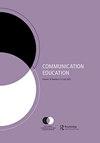Reconciling romanticization and vilification: constituting post-pandemic communication pedagogy
IF 0.8
Q3 COMMUNICATION
引用次数: 4
Abstract
Whether online teaching is a challenge or an opportunity is the wrong question for us to ask and answer. Online teaching in myriad forms has been essential to teaching and learning--though to different degrees depending on the discipline, institution, student, and educator--for decades and will remain so. Though the authors of this article have some concerns about what it means to maximize variables and to engage in course design in an opportunistic way, they agree not only that communication scholars are well poised to lead other disciplines in defining the post-pandemic higher education landscape, but also that they have a responsibility to do so. However, to succeed, this endeavor must be fundamentally intersectional--of identities, methodologies, and paradigms--and communication scholars must re-engage their most fundamental assumptions about communication itself and the purpose of their work as teacher-scholars.调和浪漫化与诽谤化:构建大流行后的传播教学法
在线教学是挑战还是机遇,这是我们不该问和回答的问题。几十年来,各种形式的在线教学对教学和学习至关重要,尽管其程度取决于学科、机构、学生和教育者,而且将继续如此。尽管这篇文章的作者对最大化变量和以机会主义的方式参与课程设计的意义有些担忧,但他们同意,传播学者不仅准备好引领其他学科定义大流行后的高等教育格局,而且他们有责任这样做。然而,要取得成功,这一努力必须从根本上交叉——身份、方法和范式——传播学者必须重新审视他们对传播本身的最基本假设,以及他们作为教师学者的工作目的。
本文章由计算机程序翻译,如有差异,请以英文原文为准。
求助全文
约1分钟内获得全文
求助全文
来源期刊

COMMUNICATION EDUCATION
EDUCATION & EDUCATIONAL RESEARCH-
CiteScore
3.10
自引率
34.80%
发文量
47
期刊介绍:
Communication Education is a peer-reviewed publication of the National Communication Association. Communication Education publishes original scholarship that advances understanding of the role of communication in the teaching and learning process in diverse spaces, structures, and interactions, within and outside of academia. Communication Education welcomes scholarship from diverse perspectives and methodologies, including quantitative, qualitative, and critical/textual approaches. All submissions must be methodologically rigorous and theoretically grounded and geared toward advancing knowledge production in communication, teaching, and learning. Scholarship in Communication Education addresses the intersections of communication, teaching, and learning related to topics and contexts that include but are not limited to: • student/teacher relationships • student/teacher characteristics • student/teacher identity construction • student learning outcomes • student engagement • diversity, inclusion, and difference • social justice • instructional technology/social media • the basic communication course • service learning • communication across the curriculum • communication instruction in business and the professions • communication instruction in civic arenas In addition to articles, the journal will publish occasional scholarly exchanges on topics related to communication, teaching, and learning, such as: • Analytic review articles: agenda-setting pieces including examinations of key questions about the field • Forum essays: themed pieces for dialogue or debate on current communication, teaching, and learning issues
 求助内容:
求助内容: 应助结果提醒方式:
应助结果提醒方式:


